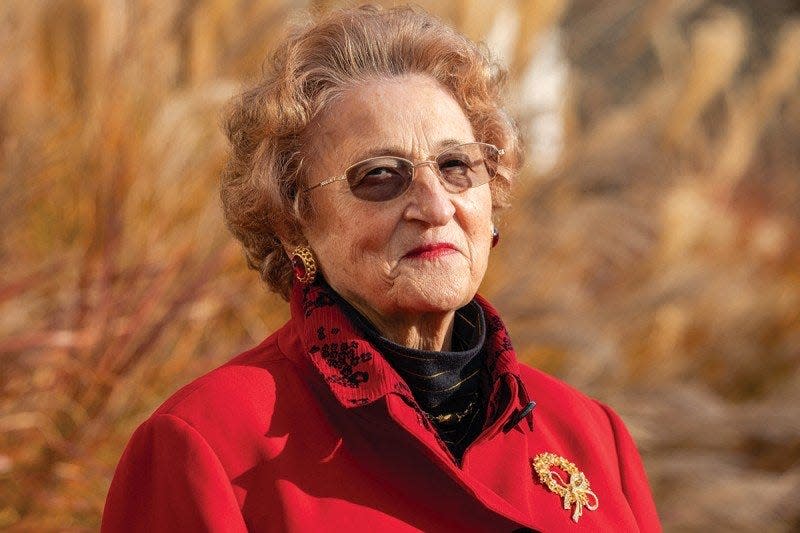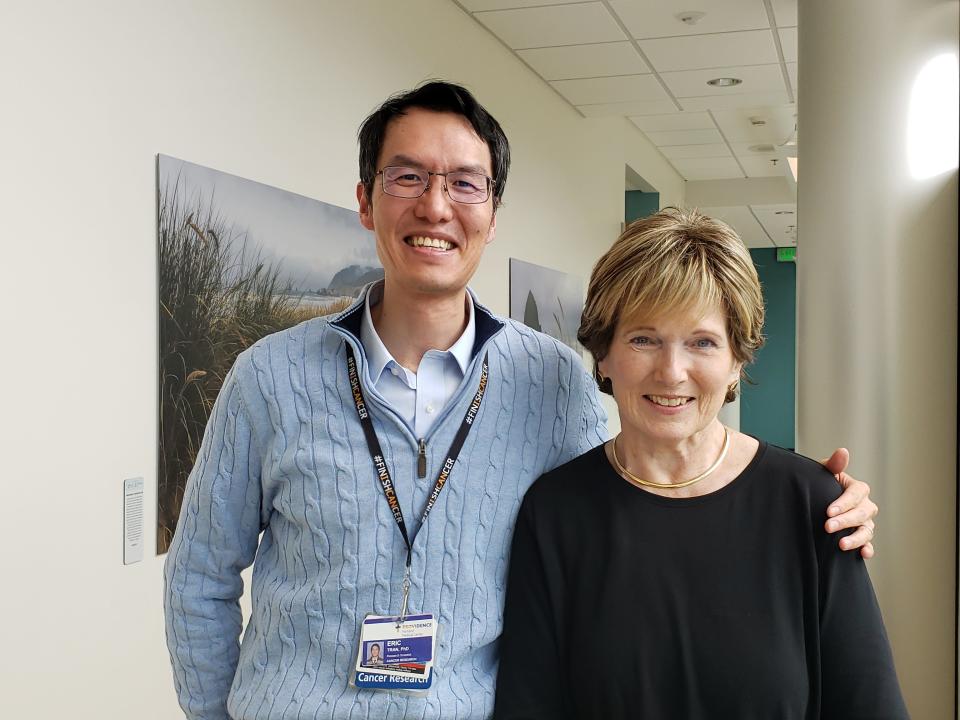‘Watershed moment’: Doctors finding new hope in treatments for deadly pancreatic cancer
Correction & clarification: A prior version of this story contained inaccurate information. Pancreatic cancer is poised to pass colon cancer as the second deadliest tumor type.
Barbara Brigham was having a very bad 2020.
Her 97-year-old mother, whom she'd cared for years, died in January. Her husband, who'd suffered the ill effects of Agent Orange since his tours of duty in Vietnam, died of cancer in June. In September, she was diagnosed with pancreatic cancer, which has a five-year survival rate of only around 10%.
Brigham, who lives on Shelter Island, between the forks of New York's Long Island, was resigned to her fate. She'd lived "an absolutely wonderful life" with terrific parents, a loving husband, three great sons and a supportive extended family.
Then her doctor offered her a spot in a trial testing a new way to stimulate the immune system against cancer.
Brigham signed on.
Nearly two years later, Brigham, now 76, is thriving. She recently watched her first grandchild graduate from college. And she's considered cancer-free.

Although the treatment she received remains in an early stage of development, it is one of a handful of advances that is providing hope to what has long been one of the most hopeless forms of cancer.
Pancreatic cancer is poised to pass colon cancer as the second deadliest tumor type, already surpassing breast and prostate cancer. Celebrities felled by pancreatic cancer include Supreme Court Justice Ruth Bader Ginsburg, Congressman John Lewis, game show host Alex Trebek, actor Patrick Swayze and singer Aretha Franklin.
And while other tumor types have seen treatment improvements in recent years, the death rate from pancreatic cancer has remained stubbornly unchanged.
"There's nothing that's put a dent in it," said Dr. Eric Tran, a research scientist at the Earle A. Chiles Research Institute, the research arm of Providence Cancer Institute in Portland, Oregon.
"We need a big breakthrough for sure," added Dr. Robert Vonderheide, who directs the Abramson Cancer Center at the University of Pennsylvania in Philadelphia.
But for the first time in his career, Vonderheide is convinced one will come soon.
"I really think in the next three to four years, we're going to have major advances for patients," he said. There needs to be "a lot of work between then and now," but he believes there is "measured hope, justified hope," against a disease that has long lacked it.
A few cutting-edge advances and some seemingly small changes have given doctors reasons for optimism, a handful of them told USA TODAY.
One is the realization that a gene called KRAS, mutated in many pancreatic tumors, could be "druggable." Target KRAS, as Tran is trying to do by manipulating the immune system, and many tumors, like his patient Kathy Wilkes', can be controlled.
Another improvement comes from a deeper understanding of the immune system and how to manipulate it to fight cancer, said Dr. Vinod P. Balachandran, Brigham's surgeon at Memorial Sloan Kettering Cancer Center in New York City.
These insights come on top of advances in surgery and the sequencing of treatments that have improved and extended patients' lives, said Dr. Gabriela Chiorean, medical director of the gastrointestinal oncology program at the Fred Hutchinson Cancer Center and a professor at the University of Washington Medicine, both in Seattle.
Researchers have also gotten better about collaborating and sharing what they learn, Vonderheide said.
"We are convinced we must do that to make progress," he said.
Small steps in the right direction
At a cancer conference last month, Chiorean said she saw two significant advances in care that gave her hope.
For advanced cancers, alternating the standard chemotherapy regimen, which is based on the drug gemcitabine, with a combination of therapies called FOLFOX increases average patient survival from nine months to 13, with manageable side effects, one of the presentations showed.
"This can be impactful immediately in the clinic," Chiorean said.
Radiation on its own has never proved useful against pancreatic cancer. But another new study suggested that patients who get radiation before surgery are twice as likely to survive for five years.
In both experimental approaches and others presented at the conference, patients' quality of life remained high, even as they lived longer. That's crucial, Chiorean said, because patients stop treatment if their quality of life is poor.
Improvements in surgical techniques and better identifying which patients will fare well with surgery and which won't have also been significant, said Dr. Daniel Labow, a surgical oncologist at Mount Sinai Health System in New York. "It's not groundbreaking," he said, "but impacting patients who have disease in real time."
Earlier diagnosis could also make a profound difference for patients, Labow and others said. Most tumors are discovered after they've spread, making them much harder to control.
The pancreas produces digestive enzymes, so gastrointestinal changes that linger, new onset of diabetes, or sudden, unexplained weight loss could indicate a brewing problem. "You need to not ignore some of those symptoms," Labow said.
So-called liquid biopsies that detect tumors early through a blood sample are not ready for regular use yet, he and others said, but could be within a few years.
Genetic screening could also identify the small percentage of people whose family history puts them at higher risk for pancreatic cancer. Heavy smokers and people with pancreatitis are also at increased risk for pancreatic tumors and could benefit from regular screening.
"The best way to cure a cancer is to prevent it from forming," Labow said. "When we get better at screening and selecting who's more at risk and targeting our investigations toward those people who are at high risk, that's going to make a big difference."

Targeted treatments
Another major lesson from recent years: Pancreatic cancer comes in many forms, and treating a patient's specific tumor can make a big difference.
That's been Wilkes' experience since her pancreatic cancer diagnosis in 2017.
She had chemotherapy, surgery, more chemo and then radiation – "That was my 2018," said Wilkes, now 71, who splits her time between homes in Florida and Kentucky.
When her cancer started growing again at the end of that year, she had a biopsy of her tumor genetically sequenced, which identified her tumor as containing a KRAS mutation.
Finding genetic mutations like KRAS, as well as the BRCA1 and BRCA2 mutations better known for their link to breast cancers, can help identify patients who will respond to treatments targeting those mutations, Vonderheide said.
Wilkes participated in an immunotherapy trial at the University of Pittsburgh in early 2020. Her first treatment was the day the hospital locked down for COVID-19.
Her tumor shrunk by a third but was growing again six months later when Tran decided she'd be a good candidate for his approach because her tumor had both a specific KRAS mutation and certain proteins used by the immune system to determine whether a cell belongs to the body or not.
Some of her immune T cells – the foot soldiers of the immune system – were removed and engineered to target the KRAS mutation expressed by her cancer cells, Tran said. Then, these T cells were infused back into her body.
By July 15, 2021, a month after that single infusion, her tumor had shrunk by more than 60%. Six months later the tumor was more than 70% reduced and nearly a year later, it is still there but appears to have stabilized.
"She's living as if she doesn't have cancer," Tran said.
Wilkes said she liked Tran's approach because it is more tumor-specific than chemotherapy, which kills healthy cells along with cancerous ones. "It makes so much sense to really target something rather than do a crop dusting to kill the weeds," she said.
For decades, doctors have tried blasting pancreatic cancer with toxic agents but haven't been able to stop the tumor's inevitable growth.
Immunotherapies, which have demonstrated remarkable success in other cancer types, have not yet been shown to be widely effective against pancreatic cancer – which is why Tran’s latest work is promising.
"The fact that we have a proof of principle that T cells are capable of causing metastatic pancreatic tumors to shrink, that's the ray of light," Tran said, noting that his approach is still early in development.
"It provides some optimism and hope for other researchers that this might be the way to go," he said. "If we can more effectively harness T cells, then we just might be able to make these tumors go away in more patients."
Taming tumors like treating COVID
Balachandran takes a different approach to manipulating the immune system.
About seven years ago, he discovered that the lucky few people who survive pancreatic cancer long-term have immune systems that recognize tumor cells and manufacture T cells to naturally keep them in check.
If he could provide a similar set of so-called neoantigens, the proteins found on the surface of cancer cells, perhaps the immune systems of other pancreatic cancer patients could learn to fight off their tumors, too, he thought.
In a small study presented last month, Balachandran showed that he could do that safely and with a hint of effectiveness.
Brigham and others in the trial received vaccines, designed to teach their immune systems to recognize up to 20 neoantigens found on their specific tumors. Once the immune system recognizes these neoantigens, it can engineer T cells to attack them.
Balachandran collaborates with Genentech, a San Francisco-based biotechnology company, and German vaccine-maker BioNTech, which co-developed a COVID-19 vaccine with Pfizer. The pancreatic cancer vaccine uses the same mRNA technology to activate the immune system.
He worried at first that the vaccines couldn't be produced quickly enough to fight such fast-moving cancer. But the trial's nine- to 10-week vaccine turnaround was good enough, the study showed, and likely to get shorter over time.
Most of the 16 trial participants were spared serious side effects and the one who did was able to get quick treatment, Balachandran said. Brigham said she had flu-like symptoms for a day or two after every one of her nine or 10 treatments, but the side effects were nowhere near as bad as with chemotherapy.
Now, Balachandran said he intends to launch a larger trial to learn whether the approach works better than standard therapies.
"We are at a watershed moment," he said. "We really need something new and something that works for patients."
For her part, Brigham is thrilled with her results so far and hopes every pancreatic cancer patient will eventually get the kind of benefit she has from immunotherapy.
The only downside, Brigham said, is that her longer survival has left her wanting more, and she's no longer at peace with the idea of her "wonderful" life coming to an end. "Now, when I go for my CT scans every three months," she said, "I'm a nervous wreck as the day approaches."
Contact Karen Weintraub at kweintraub@usatoday.com.
Health and patient safety coverage at USA TODAY is made possible in part by a grant from the Masimo Foundation for Ethics, Innovation and Competition in Healthcare. The Masimo Foundation does not provide editorial input.
This article originally appeared on USA TODAY: A breakthrough for pancreatic cancer treatments is near, doctors hope

 Yahoo Movies
Yahoo Movies 
